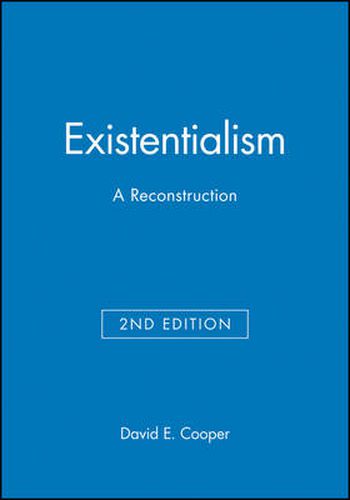Readings Newsletter
Become a Readings Member to make your shopping experience even easier.
Sign in or sign up for free!
You’re not far away from qualifying for FREE standard shipping within Australia
You’ve qualified for FREE standard shipping within Australia
The cart is loading…






First published in 1990, Existentialism is widely regarded as a classic introductory survey of the topic, and has helped to renew interest in existentialist philosophy. Utilizing recently published primary sources, David E. Cooper provides a sympathetic, original account of a mainstream movement of philosophical thought, reconstructed from the best writing of Heidegger, Sartre, Merleau-Ponty and others. Existentialism is viewed as the attempt to overcome various forms of alienation: from the world, one another and oneself.The early chapters describe the existential phenomenology, on the basis of which the dualisms of Cartesian metaphysics are dissolved . Discussions of the self and others, and of Angst and absurdity, lead into chapters on existential freedom and the prospects for an existentialist ethics. Writers discussed, include Husserl, Jaspers, Buber, Marcel, and Ortega. The author places existentialism within the great traditions of philosophy, and argues that it deserves as much attention from analytic philosophers as it has always received on the continent.
$9.00 standard shipping within Australia
FREE standard shipping within Australia for orders over $100.00
Express & International shipping calculated at checkout
Stock availability can be subject to change without notice. We recommend calling the shop or contacting our online team to check availability of low stock items. Please see our Shopping Online page for more details.
First published in 1990, Existentialism is widely regarded as a classic introductory survey of the topic, and has helped to renew interest in existentialist philosophy. Utilizing recently published primary sources, David E. Cooper provides a sympathetic, original account of a mainstream movement of philosophical thought, reconstructed from the best writing of Heidegger, Sartre, Merleau-Ponty and others. Existentialism is viewed as the attempt to overcome various forms of alienation: from the world, one another and oneself.The early chapters describe the existential phenomenology, on the basis of which the dualisms of Cartesian metaphysics are dissolved . Discussions of the self and others, and of Angst and absurdity, lead into chapters on existential freedom and the prospects for an existentialist ethics. Writers discussed, include Husserl, Jaspers, Buber, Marcel, and Ortega. The author places existentialism within the great traditions of philosophy, and argues that it deserves as much attention from analytic philosophers as it has always received on the continent.